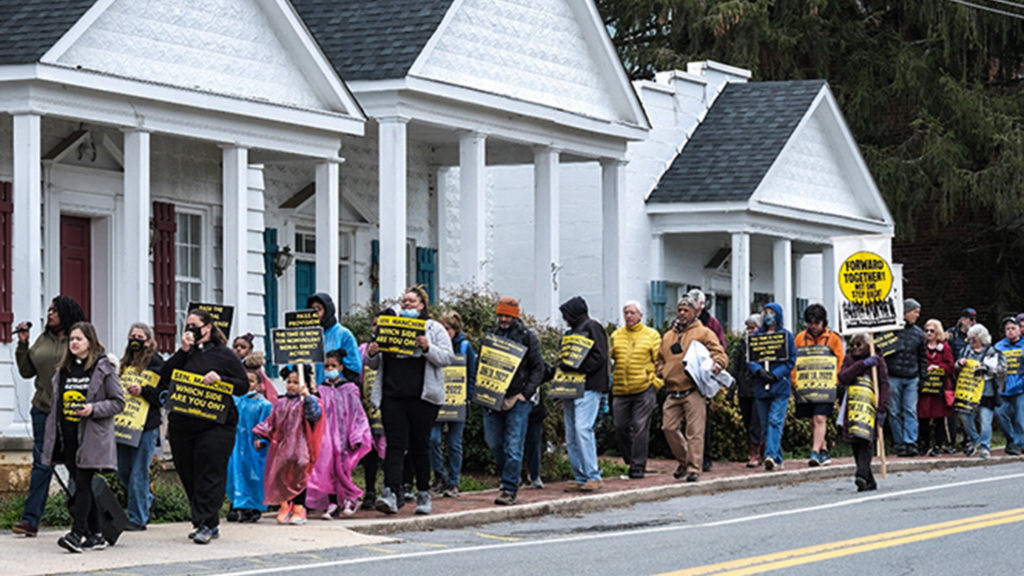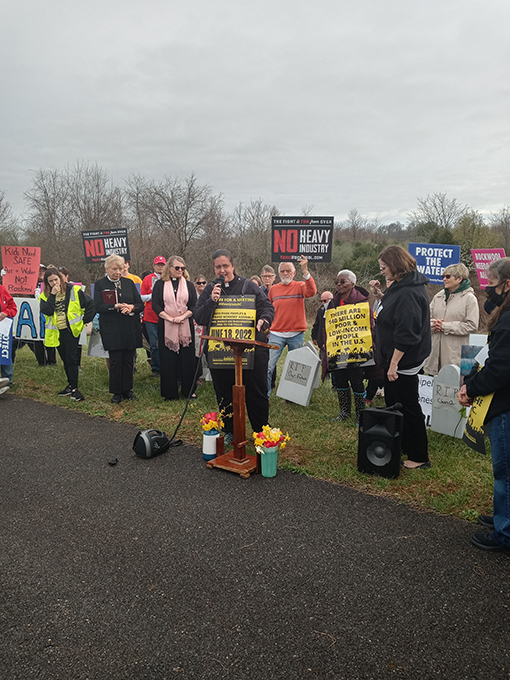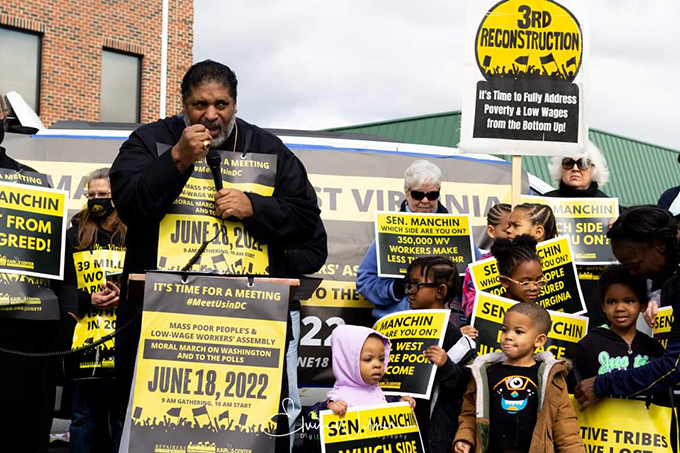The March Across the Shenandoah Valley
By Stewart Acuff

Part 1
Walking up yet another hill on the march across the Shenandoah Valley in a hailing rainstorm, organizer Clinton Wright asked: “How does this make sense, walking uphill toward the thunder?” laughing with the 20 or so soaked other marchers on the third morning of the walk.
The 23-mile, four day march the first week of April from civil rights sacred space, historic Harpers Ferry to de- industrialized struggling Martinsburg, West Virginia came from a request to Bishop William Barber that the Poor People’s Campaign join local folks in a protest against the toxic Rockwool factory polluting the valley.
Progressives and activists across West Virginia have been working intensely in our communities and with Bishop Barber and the Poor People’s Campaign pushing hard on WV Senator Joe Manchin for more than a year, since he locked himself down to prevent federal help for poor and low wage working West Virginia families.
As Manchin first blocked $15 minimum wage in Biden’s first Covid bill to his single-handed destruction of the child tax credit, to his determined defense of the racist filibuster killing voting rights, to his rejection of new union jobs building clean and green energy, West Virginians have become increasingly outraged.
We have rallied at Manchin’s offices, marched at the nation’s Capital, engaged in nonviolent civil disobedience and been arrested, sent letters and made phone calls , steadily escalating tactics in a real life and death fight for democracy, for workers and the poor and for the health of the Earth and her climate.
On a chilly, drizzling wet Tuesday morning April 5 Bishop Barber gathered 60–70 of us in front of the gates of Storer College, the history filled former college for Black students built right after the Civil War where Black scholar W.E.B. DuBois had brought the second meeting of the Niagara Movement while creating the NAACP; in the town where John Brown and his men tried to start a rebellion of the enslaved.
The presidents of both Jefferson County and Berkeley County NAACP joined the gathering with three local clergy, working families and environmental activists.
After the welcomes and prayers Bishop Barber with his disability and Rev. Dr. Liz Theoharis led the crowd down the hill, up Washington St. and out onto Highway 340 West toward Martinsburg and Joe Manchin’s office 23 miles away.
Much more to come.
Part Two
We walked five miles that first day all on the shoulder of federal highway 340, the highway that runs north-south on the bottom of the historic and beautiful Shenandoah Valley. I was amazed that first day and every day after at the strength and stamina, singing voice, chanting and positive perspective of Rev. Dr. Liz Theoharis. Radio host and longtime friend Rev. Mark Thompson walked the whole way with us that day and every day. Rev. Mark interviewed most of the folks who walked every day getting a wonderful down to the ground very real story of the march. Rain drizzled on us off and on during the day.
At the end of the day our support bus took us to back to our cars to sleep at home.
Wednesday was our hardest, longest day but very sweet for those of us who’ve been fighting for four years against a poisonous and toxic insulation factory owned by a global colonial corporation called Rockwool from Denmark. All day while we walked, we sang and chanted against Rockwool for seven and a half miles till we saw their filthy burnt carbon pouring from twin smokestacks smoking.
We marched into a rally against Rockwool timed to greet the march with more than a hundred residents of the WV Eastern Panhandle determined to shut down Rockwool. One by one local residents told of its negative health, environmental and economic effects……
And Rockwool’s ugly contribution to climate change.
Presbyterian minister Gusti Newquist prayed and spoke as did the veterinarian from the race track that drives much of the local economy, a pulmonary scientist from the National Institute of Health, mothers, a beekeeper and a couple farmers, education advocates warning of the dangers to kids at the elementary school only a half mile away.
When we went home toward dusk, we had taken another step toward saving our valley.
Part 3
It stormed off and, on all day, — a cold spring rainstorm or thunderstorm with thick, heavy rain, even hail.
And we kept walking, pausing only briefly under a bridge when the raining was its heaviest.
The most indefatigable of all the beginning to end marchers were the two strong women clergy leaders: Rev. Robin Tanner and Rev. Dr. Liz Theoharis, neither of whom wavered ever over the entire week. I got a close look at the extremely competent, kind and strategic staff and leadership of the Poor People’s Campaign. They were all extraordinary. And fun.
Rev. Dr. Liz led us in a brief service of prayer and reflections our fourth morning outside the Eastern Regional Jail where so many inside are victims of opioid pushing by big pharma and grinding poverty and Joe Manchin’s attacks on the poor.
Leaving the jail, we marched into Martinsburg with pride all the way to Courthouse Square, the middle of town in rural America where we leafletted about the Saturday rally.
We ended our March Across the Shenandoah Valley with a last mile march to Joe Manchin’s Martinsburg office Saturday morning where Bishop William Barber, nonviolent holy warrior for love and justice, charged Joe Manchin with his assault on the poor and low wage workers, on the economy and the environment. Then he lifted us up again with a vision of the future where the world is more just and our earth more healthy and our people more secure and life sweeter.
Stretching his massive hands and arms reaching out in solidarity, about 20 us with the Bishop roared out of Martinsburg to drive 200 miles across West Virginia mountains to the only power plant that burns the waste coal that Joe Manchin’s company sells. There near Fairmont we joined a demonstration of environmentalists at a plant gate in the rain still falling, our feet in the black mud of Joe Manchin’s filthy coal and heart.
We ended our week of walking across the Shenandoah Valley and challenging Manchin at the very place his corruption begins with an all souls worship service Sunday morning at the Manchin dirty power plant in reverence and protection of creation.
…
On June 18th there will be a gathering from all over the United States, for information on the “POOR On June 18th the “POOR PEOPLE’S AND LOW-WAGE WORKERS’ ASSEMBLY AND MORAL MARCH ON WASHINGTON AND TO THE POLLS” will gather from around the country, for more information click here.


Excellent article, Stewart. I think my favorite line, among others, is “ our feet in the black mud of Joe Manchin’s filthy coal and heart.”
Thanks my union brother!! Solidarity Forever with workers & creation!!
We stand in awe witnessing fine upstanding leaders, speaking and encouraging our fellow workers, fellow human being to follow the path mother nature intended us to do. No greater amount amount of propagation can emphasize the need for our planet to stop polluting. All workers deserve dignity in work place and at home and in life. Stewart Acuff and friends are what we need more of in this country, in this world. I hope and pray we are not too late